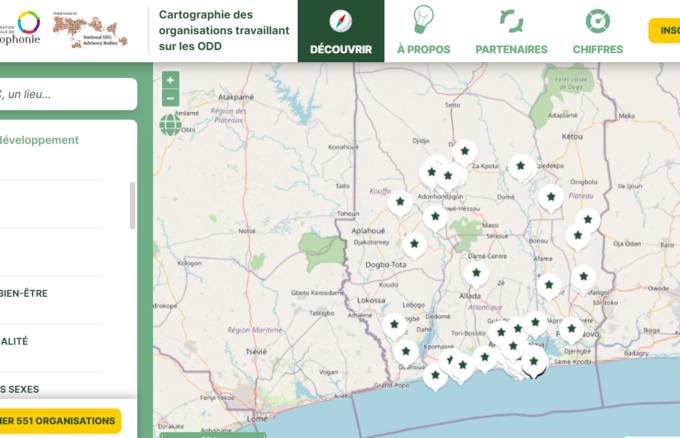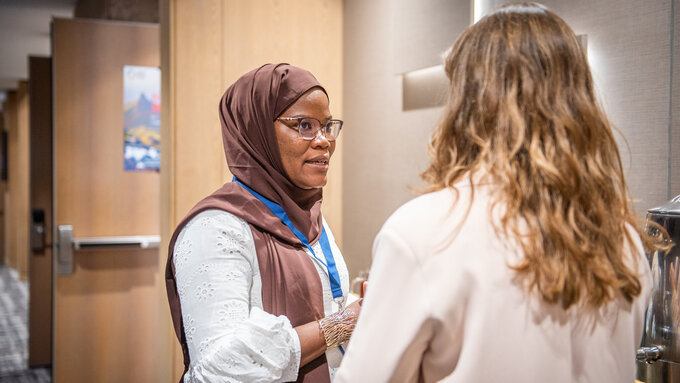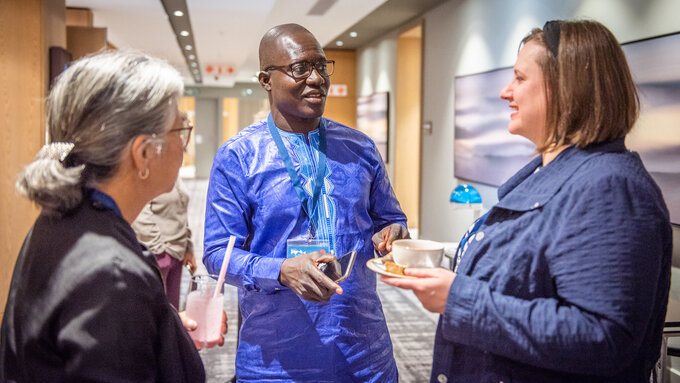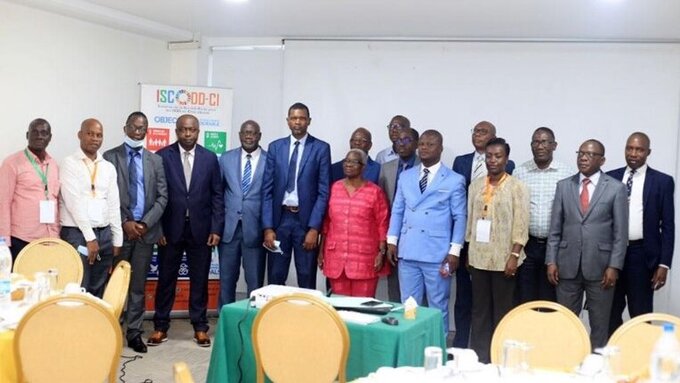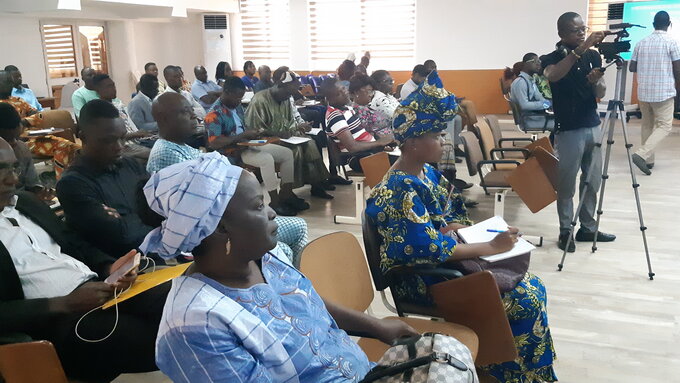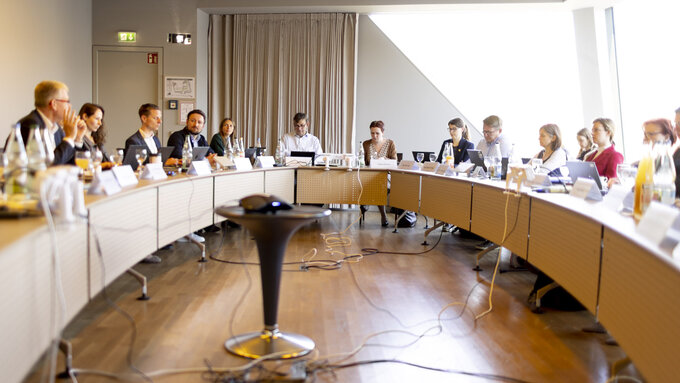Stakeholder mapping and the use of regional dialogues
Global Forum members have implemented SDG stakeholder mapping and round table dialogues with the goal of enhancing the visibility and network character of existing organizational efforts to implement the UN SDGs.
Partners and members
Project partners
- The Institute of the Francophonie for Sustainable Development (IFDD - Institut de la Francophonie pour le développement durable), a subsidiary body of the International Organization of the Francophonie (OIF - Organisation internationale de la Francophonie).
- German Council for Sustainable Development (RNE - Rat für Nachhaltige Entwicklung), acting as adviser to the project, has worked in partnership with five Global Forum members.
Involved Global Forum members/countries
- Benin
- Cameroun
- Côte d'Ivoire
- Senegal
- Togo
The project
With the project “Enhancing the visibility and network character of existing organizational efforts to implement the UN”, piloted in 2021 in Bénin and Togo, we have pursued an approach that accentuates the potential of SDG stakeholder mapping, local round table dialogues and digital visibility for accelerated SDG delivery. As the main outcome, the project has brought forth a digital map which aims at making visible, and thereby strengthening the engagement of relevant civil society organizations (CSO) in implementing the SDGs. This in turn has the potential to better connect civil society engagement to relevant national governance architectures and sustainable development policies.
The creation of an accessible digital map of active SDG actors and their organizational efforts has allowed for detailed knowledge on local areas of activity and the sectorspecific topics of all engaged CSOs. The enhanced visibility has also made it possible to uncover interlinkages between SDG stakeholders and thereby potentially develop innovative partnerships for further coordination and knowledge sharing towards a common goal. Moreover, the project has raised awareness beyond those CSOs already engaged in SDG implementation, and therefore bears the potential to provide a pull-factor for other actors to initiate action in the future.
To achieve these objectives, the implementing organizations:
- organized local roundtables to connect and identify relevant CSOs, sensitize them for the SDGs, and identify local network themes
- developed a verified inventory of active CSOs as an overview and reference-point to connect existing organizational efforts
- created a digital and easily accessible online map, to make the inventory available to relevant policymakers and a wider public, including the option to add organizations in the future.
Why a digital map?
The creation of an inventory and its visualization through a digital mapping tool represent an innovative approach to mobilize SDG stakeholders and enhance cooperation across all sectors. Through the combination of eye-catching data visualizations and the innovative representation of organizational efforts, the added value of this project therefore lies within the effective entry point for conversations on the role those local actors play in the implementation of the 2030 Agenda. The digital map was created on a designated web page to make the inventory visible to a wider public, as well as accessible and easy to use for all actors involved.
The digital map was discussed at length with all project partners and its form was chosen based on its feasibility and added value for the CSOs at local level. The digital map enables the search for CSOs based on a variety of criteria. It improves the visibility of organizational efforts to implement the SDGs and thereby enables links between CSOs working in the same region or on the same SDGs.
What did we do?
IFDD and RNE jointly developed a six-step methodology and an inventory template. To facilitate the process of inventorying and classifying CSOs, a preliminary training workshop was organized in early 2021. In this workshop, all partnering organizations jointly discusses the project’s objectives and engaged in interactive training sessions on the mapping exercise. In this way, the implementing partners developed a common understanding of the project and familiarized themselves with the process, the methodology, and the inventory template. They adapted it to their respective national contexts through practical case studies to ensure high data quality and efficient procedures throughout the project.
Six-step Methodology
- Outset
Training, status quo assessment, pre-selection, networking, conceptualization. - Roundtables
Identifying a maximum of relevant CSOs and their core areas of work, inviting them to local roundtable dialogues, connecting them to each other, raising their awareness for the SDGs. - Research
Gathering data on the identified CSOs, creating a preliminary inventory. - Verification
Verifying the data based on a three-step process (self-evaluation, quality control by the implementing partner, quality control by an independent source). - Inventory
Creating the inventory. - Classification
Classifying all organizational efforts and activities of identified and verified CSOs according to the 17 SDGs and their 169 targets.
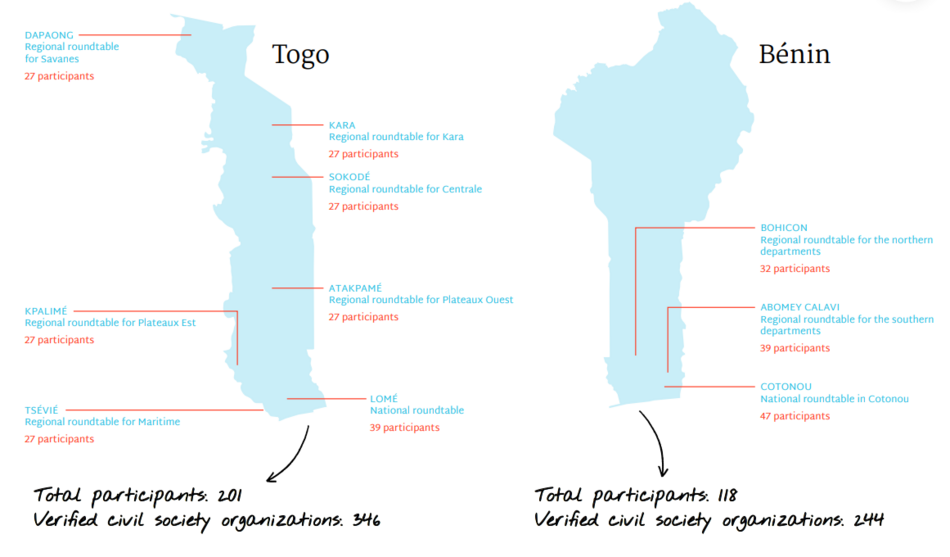
Download the snapshot publications:
EN: Snapshot of a Global Forum project in Bénin and Togo on SDG stakeholder mapping, round table dialogues and digital visibility for accelerated SDG delivery
This snapshot highlights the project’s results, thereby presenting its methodological concept. The implementing Global Forum working group focussed on improving the visibility and network character of existing actions for the implementation of the SDGs in Benin and Togo. They chose an approach that emphasized the potential of SDG stakeholder mapping, local round table dialogues, and digital visibility to accelerate SDG implementation at local level. The main outcome of the project is a digital map to make visible and thereby strengthen the engagement of relevant civil society organizations in the implementation of the SDGs.
Download (opens in a new window). (This PDF may not be accessible)FR: Aperçu d’un projet du Forum Mondial, 2022: Renforcement de la mise en réseau et de la visibilité des efforts organisationnels existants pour mettre en œuvre les ODD
Le groupe de travail du Forum Mondial chargé de la mise en œuvre s’est concentré sur l’amélioration de la visibilité et la mise en réseau des actions existantes pour mettre en œuvre des ODD au Bénin et au Togo. Ils ont choisi une approche qui mis en exergue le potentiel de la cartographie des acteurs des ODD, des espaces de dialogues au sein de tables rondes locales et de la visibilité numérique pour accélérer la réalisation des ODD. Le résultat principal du projet est une cartographie numérique qui vise à rendre visible, et donc à renforcer l’engagement des organisations de la société civile (OSC) impliquées dans la mise en œuvre des ODD. ( Juillet 2022)
Download (opens in a new window). (This PDF may not be accessible)

